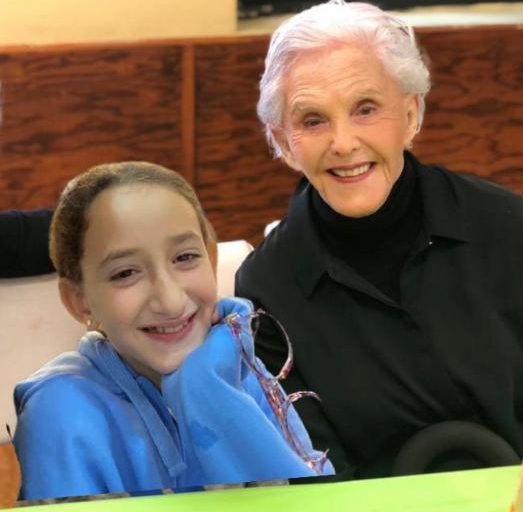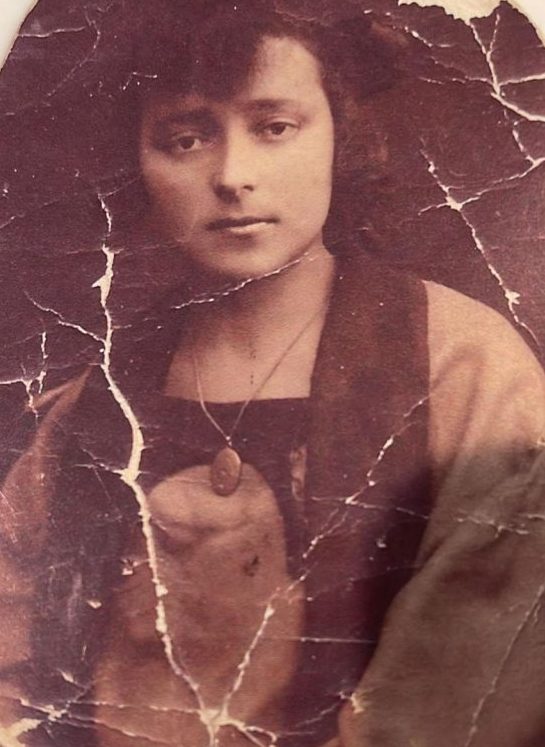My Grandma's Childhood


Chanale was born on August 10, 1902 in the little shtetl of Dizna in Poland (now Belarus). Her mother's name was Reina Chitro and her father was Nachum Zwierankin. Chana was the older sister to Faigele, Brocha and Beryl. The family owned a cow and horses. My grandmother remembers that when a baby calf was taken away, the mother cow mooed for days after.
Chanale and her sisters slept on top of the oven on mattresses made of straw with pillows and comforters stuffed with goose feathers. They took very good care of these because they were for their dowries when they would leave and marry.
Everyday her father would leave very early in the morning to pray and go to the shtetl's one-room shop where he was a tailor. When Chana'le was only 17 years old, her mother died from influenza, and Chana was left to take care of her father, sisters, brother and their home.
She would get up every day at dawn, washing in a small basin, brushing her teeth with coal, smoothing her long black hair and putting on her petticoats to keep warm. Before she left, she made sure Faigele, Brocha and Beryl were awake. Her sisters would help with cooking and washing, and her brother Beryl would tend the garden, planting vegetables.
It would be cold and dark when Chana'le would leave to go to work at the bakery. She was grateful for this job and loved it because the owner was good to her and would give her some sweets and rolls to take home.
One day while Chanale was busy working, Yankel came to the shop. Yankel was very shy, but Chanale knew that they liked each other. He was almost 19, and lived in the shtetl of Glembokie, just down the road. On this day he came to tell her that his sisters and brothers that lived in America were sending him a boat ticket to go there. He asked her to marry him and if he saved up enough money there to buy her a ticket.
She said yes, but worried about who would take care of her father, sisters and brother.
When it was time to go home, Chanale and Yankel walked home. When they came to the house, they waited for Nahum to wash his hands and say the blessings. Her father was now ready for whatever would come. Yankel was so excited, and said: "Nochum, Chana and I want to marry. I am leaving for America, and when I get there I will work and save enough money to buy a ticket for her to come". "Well," Nochum said, "I will approve, but only if you don't get married now, but promise to each other to wait till the time that the money for the ticket is earned". So, they went to the Rabbi and made a contract to marry when Chana would arrive in America.
When Yankel arrived at Ellis Island, America's quota (how many people from Poland they would allow into the United States) did not allow him to stay and sent him to an island called Cuba, where emerald water and warm air entered their lungs. This is where Yankel and Chana would start the journey of the rest of their lives.
The men from Europe helped each other bring their loved ones to Cuba, and so Yankel was able to send Chana money for a ticket. She went to a wise Rabbi and asked for advice if it was good to leave Poland. The Rabbi said yes and gave her a blessing. She packed her two down pillows and the silver candlesticks her father had given her. She left her heavy clothes for her sisters, and cried untill the boat left the dock. She would never see her family again.
Chana sailed to Amsterdam, and then on to Cuba in 1926. She didn't know the language of her new land, Spanish. Soon, more immigrants would come and they would all become friends, with the men working on the docks, and the women making homes. They all still dreamed of America, where everyone had brothers and sisters.
In 1927, Chana had a baby girl, who looked just like Chana with black hair and eyes, and named her Reina Sarah. Soon, Chana joined the other women in the community of Polish Jews as they worked with their husbands to make shops – a butcher, a tailor, a coffee shop, a bakery. They started a small Jewish school and a shul. The children spoke Yiddish and soon were speaking Spanish. They were happy living in La Habana Vieja (Old Havana) and to be on this beautiful island together.
But they still dreamed of America, where everyone had brothers and sisters. It took Chana and Yankel with their children, Reina and Isaac, 20 years to get there.
In May 1939, the Cuban Jewish Community became aware of the tragedy happening in Europe. The ship named S.S. St. Louis, carrying 937 refugees, was denied entry into Cuba. The boat sailed between the US and Cuba, and eventually sent back to Europe, where many later died in Nazi concentration camps.
Chana was now very worried for her family, no letters had arrived for a long time. Chana did not know that in 1942, her entire hometown of Dizna was murdered by the Germans.
In the early 1940's, refugees from Belgium and Holland were allowed to enter Cuba. They were part of the diamond cutting industry. Chana paid the $300 a week to teach Reina and Isaac to be apprentices. In 1943, the family was able to sail to America and settle in Brooklyn, where Yankel's family lived.
The early years in NY were hard, and the family had difficulty learning the language and starting again in a cold city. Their American family was loving and supportive, and Chana and Yankel heroically made a good life, overcoming their humble beginnings. Chana led the family with her compassion, street smarts, honesty, love for her family and her belief in the future.
Chana Zwierankin Tilles lived through World War 1 and the Russian Revolution. She cared for her father when he had cholera, and her siblings. She could read and speak in Russian, Polish, Yiddish, Spanish and English. She overcame two life changing moves across continents, and raised two children while being a working mother.
Her Great-great- great granddaughter Chana Emunah Kule zl, and her great-great-granddaughter Chana Dabah Rapoport proudly carry her name. May her memory be a blessing.
She will never, ever be forgotten.
הזוית האישית
Elle: Thank you grandma for participating in the program with me and sharing this story. I love you, I miss you and I wish I will see you soon.
מילון
Cubais a country comprising the island of Cuba, as well as Isla de la Juventud and several minor archipelagos. Cuba is located where the northern Caribbean Sea, Gulf of Mexico, and Atlantic Ocean meet. (Wikipedia)
Shtetl
A shtetl or shtetel is a Yiddish term for small towns with large Ashkenazi Jewish populations which existed in Eastern Europe before the Holocaust. The term is used in the contexts of peculiarities of former East European Jewish societies as islands within the surrounding non-Jewish populace, and bears certain socio-economic and cultural connotations. (Wikipedia)
Dowry
A dowry is a payment, such as property or money, paid by the bride's family to the groom or his family at the time of marriage. Dowry contrasts with the related concepts of bride price and dower. While bride price or bride service is a payment by the groom, or his family, to the bride, or her family, dowry is the wealth transferred from the bride, or her family, to the groom, or his family. (Wikipedia)
ציטוטים
”She was grateful for this job and loved it .“”Chana did not know that in 1942 her entire hometown of Dizna was murdered by the Germans“






